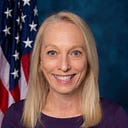Election Security Hearing Opening Remarks: “Elections cannot be a partisan issue — they must be an American issue”
Congresswoman Mary Gay Scanlon’s opening remarks at the House Judiciary Committee’s hearing on Election Security:
“Last month, this Committee held Part I of this series of hearings on Securing America’s Elections. In that hearing, the three witnesses jointly selected by the Committee testified unequivocally that our nation’s elections are under attack.
“Deborah Plunkett, former Director on the National Security Council under both President Clinton and President George W. Bush, warned: “We must take bold, decisive, and expeditious steps to address cyber threats. . . . We must treat election security as imperative for safeguarding our democracy.”
Secretary of State Kathy Boockvar, from the Commonwealth of Pennsylvania, elaborated: “Election security is a race without a finish line, and our adversaries are not slowing down.”
“This testimony has been confirmed by the leaders of our intelligence community. Last month, the Director of National Intelligence testified that, “foreign actors will view the 2020 US elections as an opportunity to advance their interests. We expect them to refine their capabilities and add new tactics as they learn from each other’s experiences and efforts in previous elections.”
“In short — there is no question that our elections — the cornerstone of our free and democratic society — are exposed.
“Protecting our Nation’s democratic processes from foreign attack must be among our top priorities.
“We are committed to doing that work.
“Today, we have representatives from the four federal agencies leading the charge on election security — the Department of Homeland Security, the Federal Bureau of Investigations, the Department of Justice, and the Election Assistance Commission.
“At their core, elections are run at the state and local level. But our federal government must provide critical support to help states to defend themselves from hostile foreign actors. Protecting our elections requires a “whole-of-society approach” that relies on coordinated actions by government agencies at all levels, including the agencies represented here today.
“Federal agencies responsible for protecting our elections have made significant progress since 2016.
“These efforts are important and commendable. But significant vulnerabilities in our systems remain.
“To start, our efforts must be integrated and coordinated. A simple google search of “report election security issue” turns up results for over 20 different groups across these agencies, and others. There must be clear lines of authority to ensure that states know which of the multiple programs across these agencies is in charge.
“Equally important, we must do more to ensure better federal and state collaboration. That requires earning the trust of states. At a public speech on October 3nd, 2018, DHS Director Krebs explained that in 2016, when the federal government called state officials to alert them of threats, there was: “no trust, and there was no certainty or confidence” in the ability of the federal government. One way to strengthen trust is through enhanced transparency. In 2016, the specific intent of the Russians was not initially made public. Today, we can do better — we can educate state and local officials, and the public, about influence operations. By bringing our adversaries’ tactics to light, we can prevent them from succeeding.
“In addition, we must ensure that the development and maintenance of our systems matches the evolving nature of cyber threats. For example, current EAC federal guidelines for our certification processes were created in 2005 — woefully out of date. As our witness Mr. Burt of Microsoft testified last month: ‘This process is more than a decade old, and it’s too slow and too burdensome to enable voting officials to respond as quickly as needed to our agile adversaries.’
“Finally, and most importantly, we must ensure that state and local officials — democracy’s frontline defenders — have the resources and support they need to protect our systems.
“DHS has made clear that it requires additional resources to fulfill this task — it requested, for example, 20 additional advisors to help states in anticipation of the 2020 election cycle. On May 15, 2019, the EAC likewise testified before the Senate that the U.S. currently “lack[s] sufficient funding” in critical areas to protect our 2020 elections.
“Unfortunately, however, the President and his Administration — rather than listening to the federal agencies’ warnings of the seriousness of the threat picture and requests for more resources to secure our elections — has done the opposite.
“President Trump’s administration has cut senior cyber positions, downsized by half DHS’s election security teams, and proposed significant budget cuts to DHS’s major election security program. All of these actions leave us more vulnerable to the ongoing threat on our democracy.
“We will not let that happen. Elections cannot be a partisan issue — they must be an American issue.
“This Committee is committed to working together to protect our democracy from all threats to our elections in all forms — whether at our physical election infrastructures, or the ongoing disinformation campaigns coming from adversaries like Russia.
“I thank each of our witnesses for being here today.
“My colleagues and I are looking forward to hearing your testimony about their ongoing efforts to secure our elections, and what important work remains to be done.”
